We waited silently, holding our breath. Around us the dense Bornean rainforest, one of the oldest in the world, lay dark and quiet.
Suddenly, a rustling in the trees. Eyes swivelled towards where the noise was coming from. All we could see was the tops of the trees swaying. As the noise grew louder the tension grew as we scanned the forest. And all at once there he was, the huge orangutan swinging from branch to branch through the drizzling rain, a sight that sent shivers down my spine.
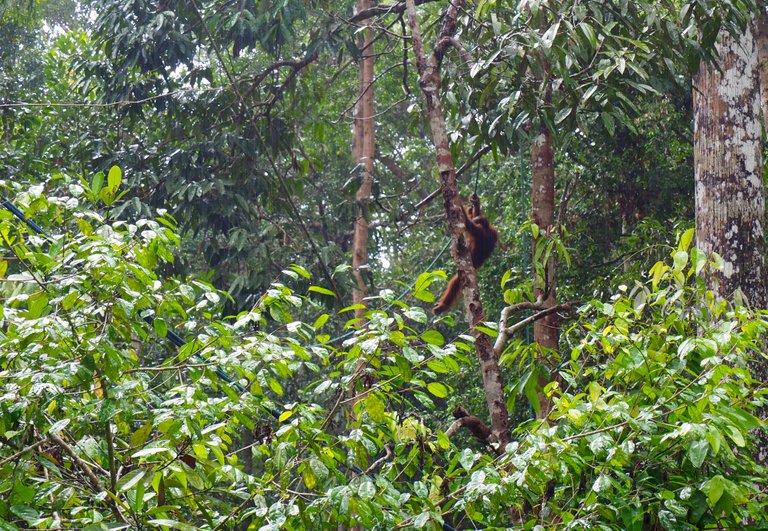
Powerfully yet nimbly he swung his way through the treetops towards the group of us that had been waiting patiently in the rain to see him.
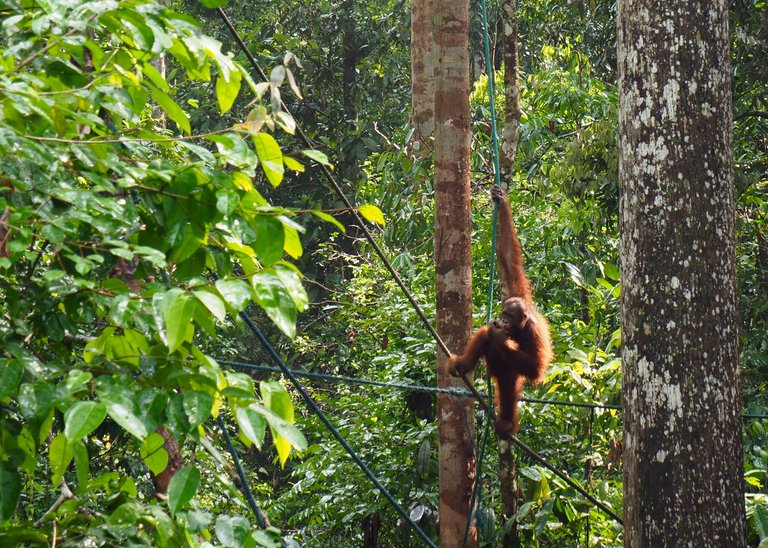
When he was above the small feeding platform, piled high with fruit, he clambered down, remarkably human like in his movements, and helped himself to a banana.
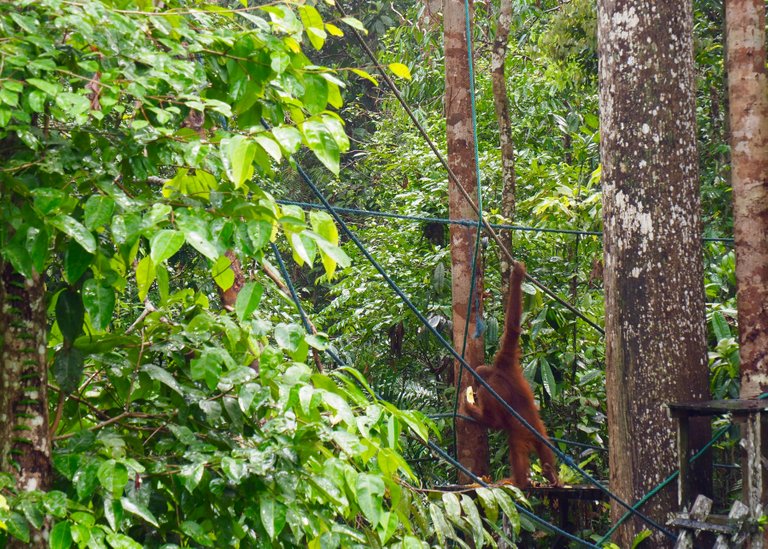
Satisfied, he was off again, climbing back up to the top of the tree, before swinging off through the canopy to get on with his day.
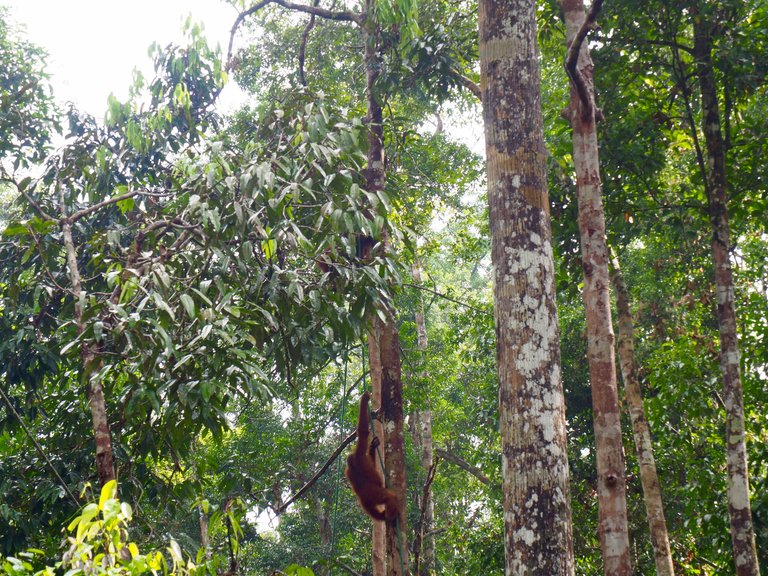
I wish I was better at photographing animals because the pictures don't do any justice to this magnificent creature and the amazing surroundings.
Semenggoh Nature Reserve
The Semenggoh Nature Reserve, just outside Kuching in the Malaysian state of Sarawak, was set up as a rehabilitation centre for orangutans that had been rescued from situations in which they had been illegally been kept as pets, or that had been found injured or orphaned in the rainforest.
It's very hard to believe how badly these animals can be treated, especially when you consider that they are one of our closest relatives, sharing 96.4% of our DNA. The word orangutan comes from two Malay words "orang" (man) and "(h)utan" (forest), showing just how human like these creatures are perceived to be.
Mother orangutans are often killed so that their babies can be captured for the illegal pet trade. Orangutans have the most intense mother-child relationship amongst mammals after humans, with babies completely dependent on their mothers for the first two years of life, and continuing to live with them until they are about 10 years old. Even after they become independent the females continue to visit their mothers until they are 15 or 16 years old. So it is especially painful to think about the youngsters being savagely snatched from their mothers and put into cages.
One of the biggest threats to the orangutan is the destruction of its habitat - the rainforests in Borneo are being destroyed to make way for palm oil plantations (due to international demand for the product which goes into things like lip balm, chocolate and ice cream); plus you've probably heard of the forest fires that are regularly deliberately set in the Indonesian side of Borneo, which also destroy orangutan habitat.
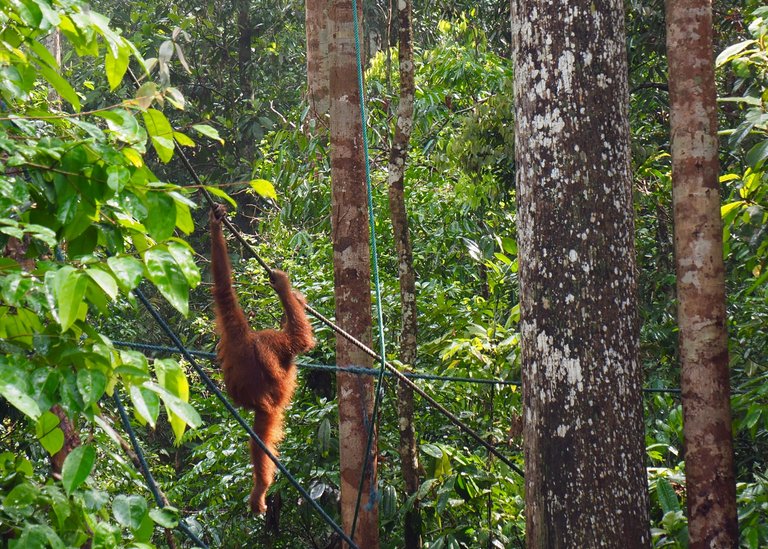
Many of the rescued orangutans have now been rehabilitated and live full time in the 653 hectare rainforest reserve. There are currently three generations of orangutans living in the forest reserve. The wardens are all able to recognise each one by name and obviously care deeply about their welfare. The centre continues to operate feeding times, twice daily, so that the orangutans can drop by for a meal, if they wish. Some of them hardly ever return, others are regulars. During the fruiting season it can happen that none of the orangutans return to the feeding sites, which the centre takes as a good sign that they are on the way to full rehabilitation.
Visitors can attend the feeding sessions, but you are fully warned that you are far from guaranteed to spot an orangutan. Apparently the morning feed, which takes place at 10am and which we had gone to, gives you a slightly better chance of spotting them.
We were given a full briefing by one of the wardens before we entered the forest, emphasising our own safety and the fact that we were now guests in the orangutans' home and needed to behave accordingly.
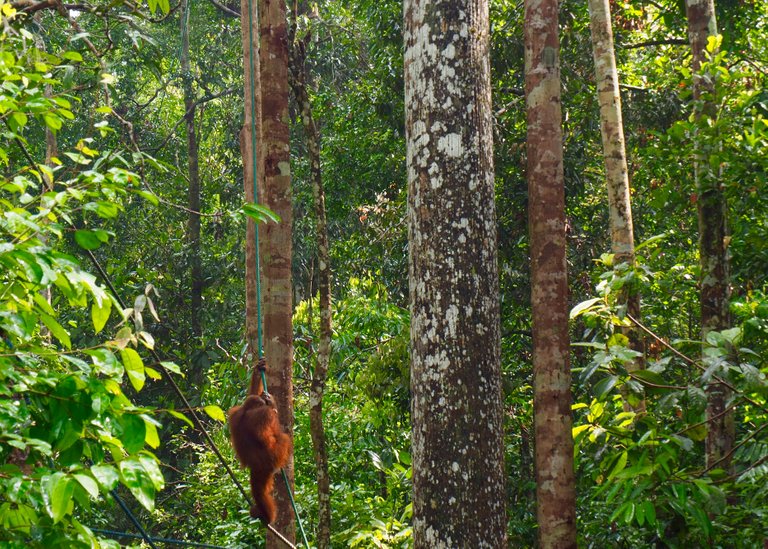
Orangutans are not usually aggressive towards humans, but they can get nervous if there is too much noise, or too many people, or if they think their babies are under threat. We were therefore to walk quietly into the forest. If the organutan made a kind of kissing, hissing sound, and started waving the branches of the tree, it was not a greeting! We should immediately crouch down to make ourselves smaller, and walk slowly away. Furthermore, flash photography was not permitted, as this can distress the animals. The warden conducting the briefing stressed over and over how important it was to follow these rules. Some of the wardens have scars from attempting to protect thoughtless visitors from injury.
Up close
We all filed into the forest, walking about five minutes along a rutted path that led us to the main feeding platform. There a viewing gallery had been constructed, and we were told to wait here in silence.
Over on the feeding platform the wardens called out to the orangutans, making a special sound that the animals would recognise as a notification that the food was ready.
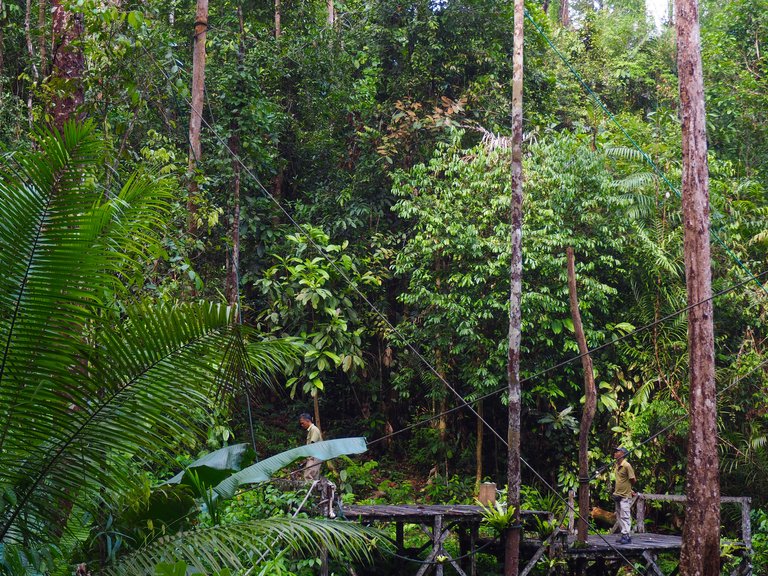
As time passed I started to think that we were not going to get lucky. But then again, I couldn't feel too sad, as the success of the programme that the centre had been running was evident in this casual attitude of the orangutans to the daily feed. Obviously they knew that they could survive alone and would decide for themselves whether they honoured us with a visit.
After around half an hour of waiting, some of the crowd got restless and began to leave. We stayed behind until the wardens started to indicate that we should make our way back towards the entrance. At first I thought that this meant that there was no chance of seeing the orangutans today, but the wardens informed us that two of them had been spotted heading towards the entrance from the other side of the reserve, and that if we walked quickly and quietly back towards where we had had our briefing earlier, we might get lucky.
Eagerly we headed back the way we had come, trying not to make too much noise. The wardens directed us where to stand and which way to look and we waited in suspense. It was then that we got what we had been hoping for, as the male orangutan swung his way powerfully through the trees to the smaller feeding station.
And then we got lucky again! One of the female members of the group had decided that it was easier just to walk down the road, rather than go through the forest. She casually wandered towards us, giving us some curious glances, but mostly not seeming to mind us at all.
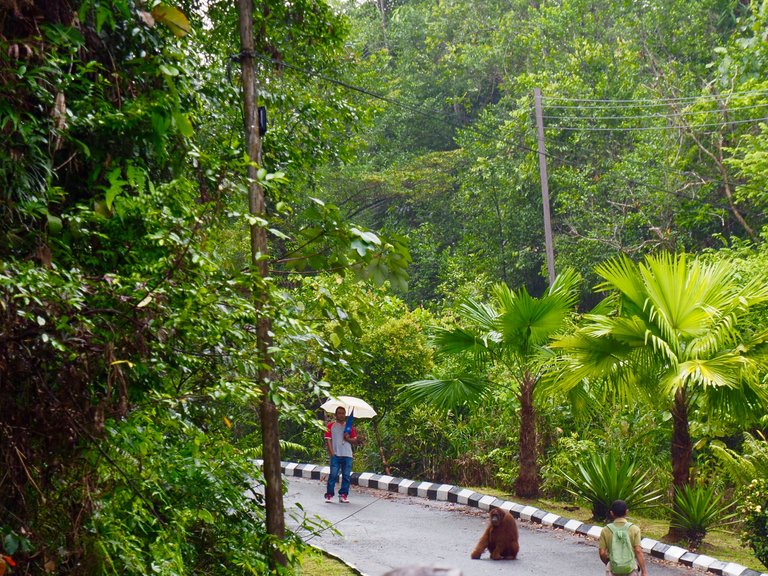
I don't think I've ever felt so keenly the sense of being an intruder in another creature's space. I found myself holding my breath as she passed by us. Again, I wish my photos were better.
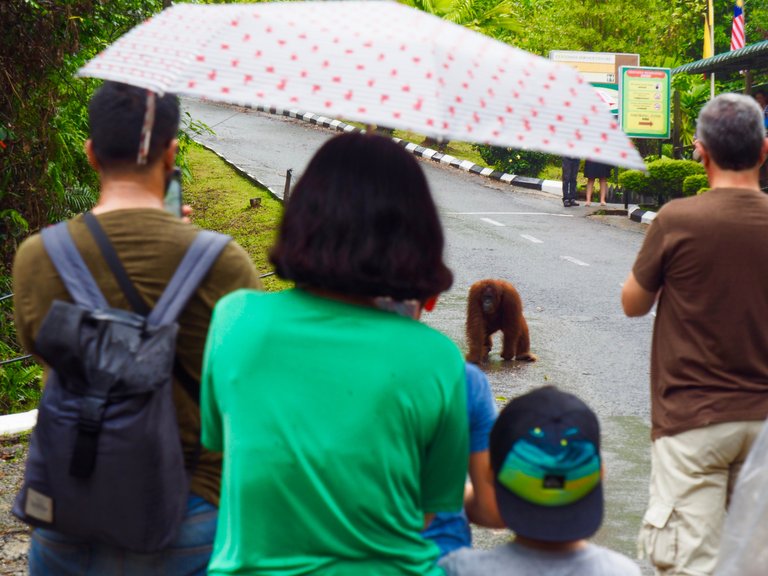
Making it look easy, the orangutan then pulled herself up into the rafters of a covered bridge that marks where the trail into the forest begins. Here she sat, contentedly cracking open a coconut and making a meal of it.
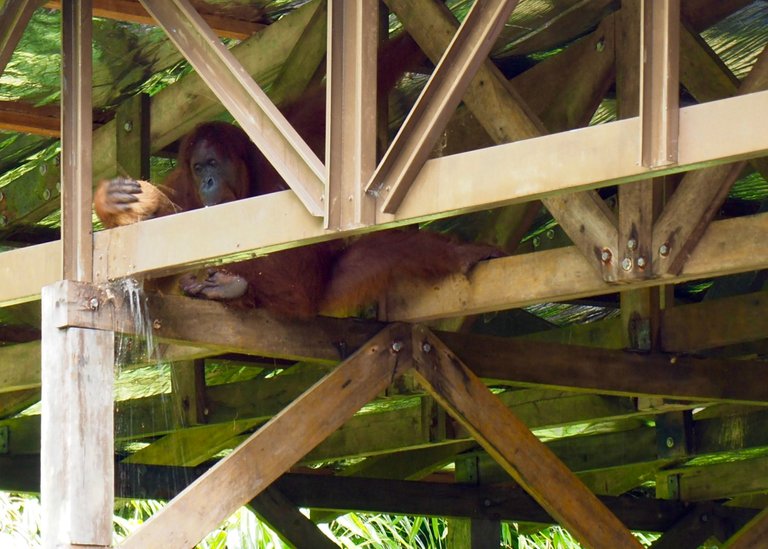
Look at those opposable big toes - how useful would that be!
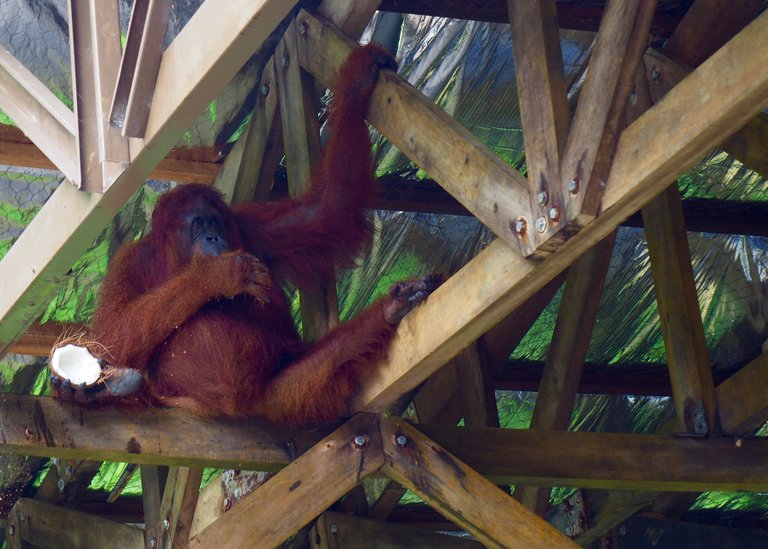
The orangutans make such human-like gestures. It's hard not to feel an affinity for them, which makes it even more difficult to believe some of the shocking stories about their treatment. Horrifyingly, an orangutan, named Pony, was discovered in a brothel in Indonesia where she had been prostituted out to men. Her hair had been fully shaved off and she was wearing bangles and necklaces. While this is hopefully a one-off case, it does go to show that there is a complete lack of care in some parts of the world for these amazing animals.
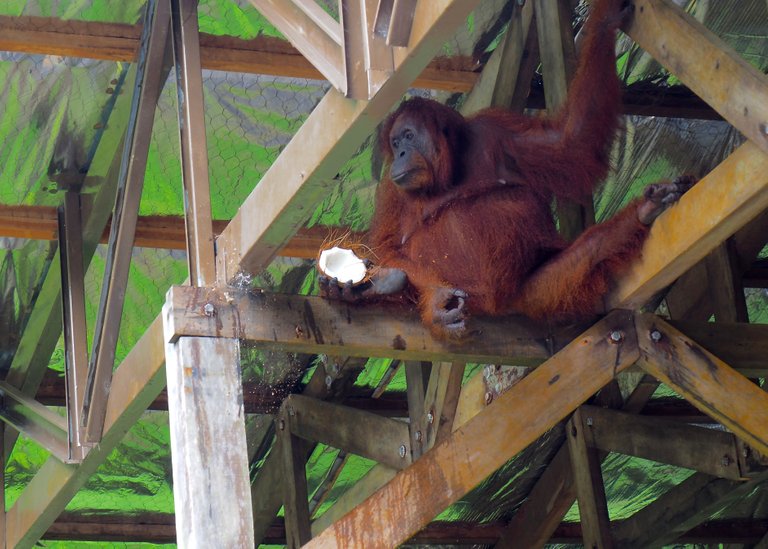
Once the female orangutan finished eating the wardens asked the crowd to move back to allow her to climb down, which she did. But rather than heading into the forest she wanted to accompany the warden to the administrative part of the reserve. She actually seemed to enjoy the attention of the crowd.
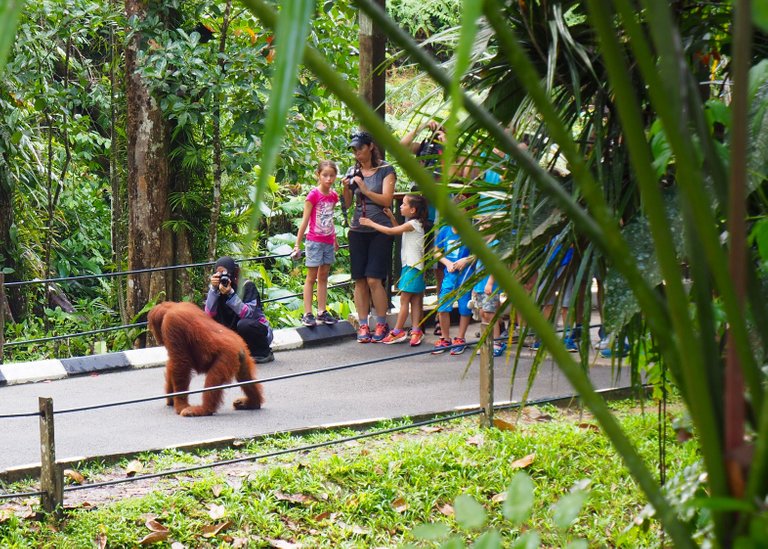
With a final look back she headed off after the warden and we humans were alone again. For the past hour or so we had been completely under the spell of these magnificent animals. It is hard not to be captivated by them, with their sorrowful looking faces, and their human antics. How unbelievably sad it would be if they ceased to exist one day.
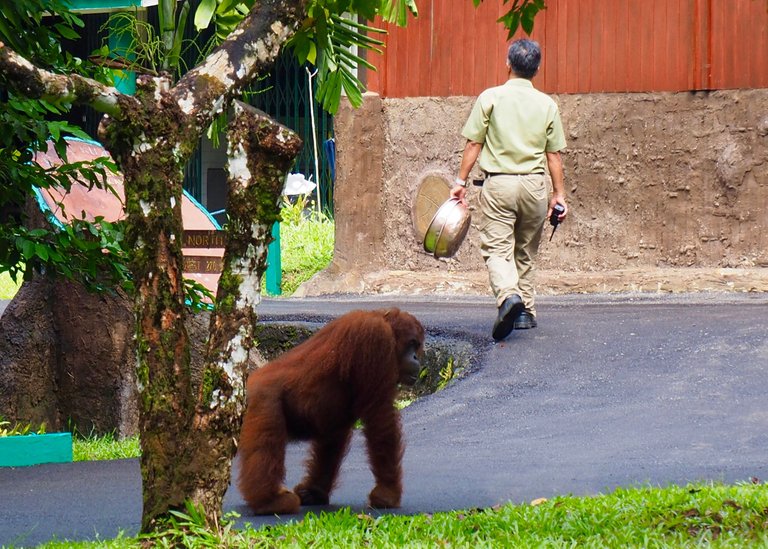
All photos by @freewheel
Congratulations, Your Post Has Been Added To The Steemit Worldmap!
Author link: http://steemitworldmap.com?author=freewheel
Post link: http://steemitworldmap.com?post=getting-up-close-with-orangutans-in-borneo--1517231056
Want to have your post on the map too?
When I read or hear pet trade and /or other awful treatment towards animals I keep thinking and/or have further evidence that the most evil animal is only the mankind
Very true. Especially as I’ve just read your post on Auschwitz, another example of pure evil.
Definetely agree with your words .